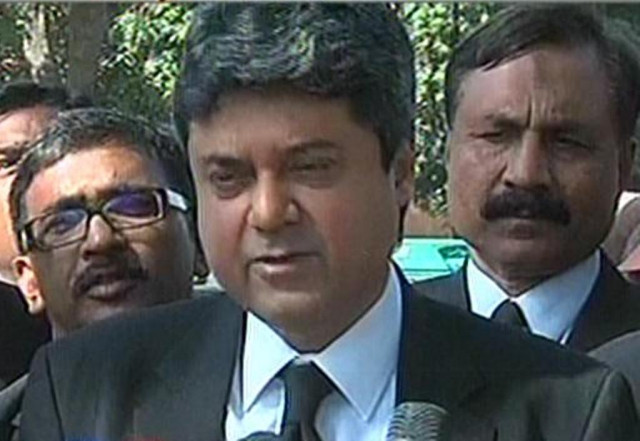SHC declares amendments to Sindh Local Government Act unconstitutional
Sharjeel Memon says delimitation process will be repeated in Sindh.

Express News screengrab of MQM barrister Farogh Naseem speaking to the media after the court announced its decision.
A divisional bench of the court made the decision after receiving 10 requests from political parties including Muttahida Qaumi Movement (MQM) and Jamaat-e-Islami, which termed the amendments to the bill unlawful.
"The court's decision is a welcome one," said MQM barrister Farogh Naseem.
He said sections 3, 4, 8, 13 as well as subsections 12 and 14 which had been added to section 18 of the bill were cause for disparities in the delimitation process. Therefore the court had declared these amendments unconstitutional, he added.
As a result of the delimitation, some constituencies had 10,000 people in them while others had 50,000 and there was no uniformity in the divisions, Naseem said, speaking to the media. The amendments that were against the fundamental right of 'one man-one vote' have been declared unconstitutional, he added.
The court said elections would not be delayed because of this decision, the barrister stated. He also stated that Sindh Chief Minister Qaim Ali Shah had told him earlier that the Sindh government would follow the court's decision on this issue.
Zardari weighs in
Former president Asif Ali Zardari met the Sindh chief minister in Larkana and discussed the local bodies elections and the latest court verdict.
He advised Shah to form a committee of senior PPP leaders to meet MQM members and address their concerns over the local bodies bill.
ECP
Election Commission of Pakistan (ECP) officials said the nomination papers were printed according to delimitations based on the amended bill. After the court's decision, the legality of these papers is now in question.
Sources from the ECP said the commission will meet today to discuss the impact of the SHC's verdict and whether the elections achedule should be changed as a result.
During the meeting they will also discuss whether or not the training of district officers and returning officers - which was scheduled for tomorrow, December 31 - should be delayed.
Delimitation
The court, in its 78-page decision, declared the November 13 notification for delimitation in rural Sindh, and the November 21 notification for Karachi illegal.
It further stated that the elections should be held according to the delimitation that was done for the 2001 elections, adding that if new delimitation was considered necessary, then an impartial forum should be made for that purpose.
After the court made its decision, Sindh local government and information minister Sharjeel Inam Memon said that the delimitation process will be repeated. He added that the 2001 delimitation will not be used as it was done during Musharraf's term to further his own agenda.
'Black law'
Earlier, Muttahida Qaumi Movement (MQM) had rejected the amendments in the Sindh Local Government Bill 2013, terming it a ‘black law’.
On December 16, the MQM’s parliamentarians had held a rally from the Sindh Assembly to the Karachi Press Club, shouting slogans against what they termed were unfair policies instituted by the amendments.
MQM later reached out to gain support from other parties in a bid against the amendments to the bill. Parties such as the Pakistan Muslim League-Nawaz and Pakistan Muslim League-Functional had backed the MQM.
The bill
The Sindh Assembly had passed the Sindh Local Government (Amendment) Bill 2013 on October 31, bringing about 31 amendments to the law amidst a protest and walkout by opposition groups.
While representatives of Pakistan Muslim League-Nawaz, Pakistan Muslim League-Functional and Pakistan Tehreek-e-Insaf had staged a walkout, MQM members stayed back to vote against the amendments.
Major amendments
All town committees, which existed prior to the enactment of the Sindh Local Government Ordinance 2001, now stand revived under the bill. Meanwhile, 22 per cent of the seats will be reserved for women, five per cent for non-Muslims and five per cent for labourers or peasants.
One member of the district council will be elected directly, while the municipal committees will elect chairmen and vice-chairmen among members by “a show of hands”.
The powers of town planning have been taken back from metropolitan corporations and handed over to the Sindh Building Control Authority, under the legislation.
No council can ink an agreement under public-private partnership to start any project without the permission of the Sindh government. In addition, the provincial government can now pass an order to remove a member and refer the matter to the election commission to issue a notification in this regard.



















COMMENTS
Comments are moderated and generally will be posted if they are on-topic and not abusive.
For more information, please see our Comments FAQ